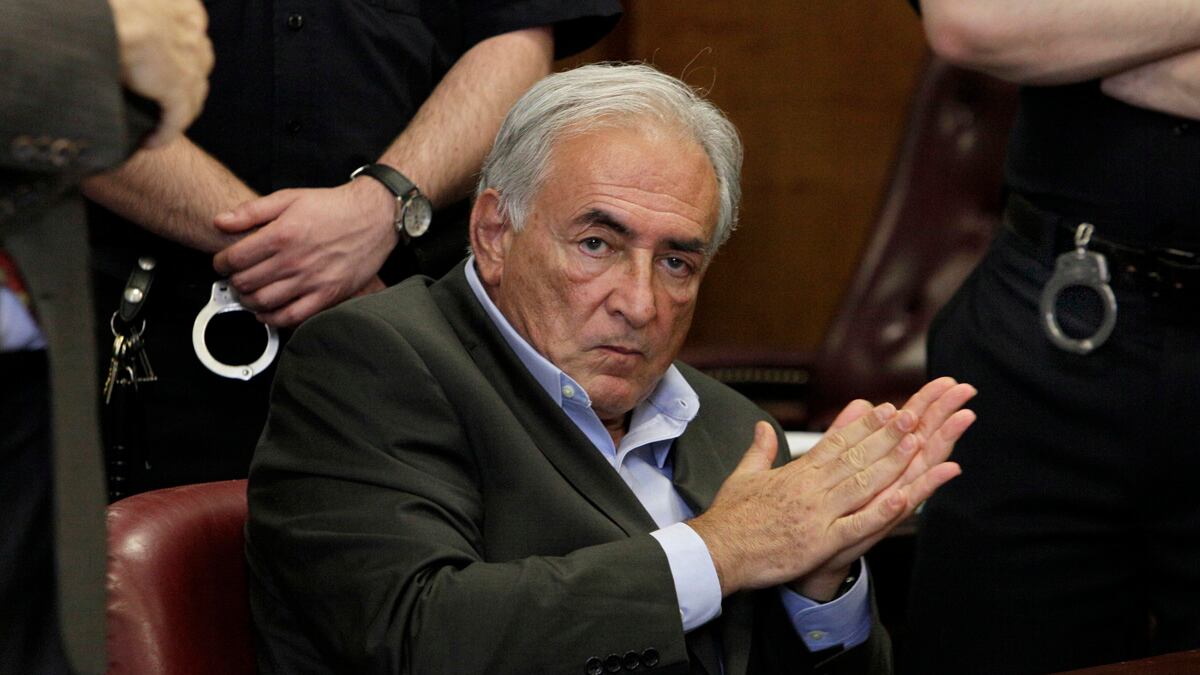The new blow against Dominique Strauss-Kahn came after 10 p.m. Monday in Lille, northern France, following eight hours of meetings with investigating judges: preliminary charges for “aggravated pimping in an organized gang” for his alleged involvement in a French prostitution ring.
The former International Monetary Fund chief being placed under investigation in the so-called Carlton Affair, coming just months after a New York hotel chambermaid accused him of attempted rape and a French novelist made a similar criminal complaint, may be the least penally serious of his three scandals over the past year. (Criminal charges were dropped in the Manhattan case, and never brought in writer Tristane Banon’s dossier, although Paris authorities suggested Strauss-Kahn may have faced sexual assault charges had a statute of limitations for that lesser charge not long since expired.) But the Carlton case, so incidentally and explicitly revealing of his secret libertine lifestyle if the allegations are proved, is seen by some as marking the definitive end of the one-time French presidential hopeful’s brilliant political career.
Strauss-Kahn, the ninth person charged in the Carlton Affair, has denied any wrongdoing since news of the alleged ring broke in October, when prostitutes’ statements to police about his alleged participation in swinger orgies were leaked to the press. He claims he had no way of knowing that the women involved in sex parties he attended in Paris, Washington, and elsewhere were being paid for their services.
After the preliminary charge was relayed Monday, Richard Malka, a lawyer for Strauss-Kahn, responded with an aggressive statement he read to waiting reporters. Describing Strauss-Kahn as the victim of a vast, invasive smear effort, Malka said “colossal police, judicial, and financial means have been deployed to endlessly pick apart and dissect [DSK’s] private life.” The ex-IMF chief has been accused of committing an infraction that “doesn’t exist,” Malka said.

“No one could understand the application of the notion of pimping in his situation and it is even more incredible and contrary to the common sense of the usage of the notions of an ‘organized gang’ or a ‘network’ to describe mere libertine activities,” Malka said. “The diversion of the offense of pimping to moralistic ends appears profoundly worrisome, as does wanting to define what should be considered good moral standards outside any legal framework. On the basis of his behavior alone, which should concern only himself and those close to him, Monsieur Strauss-Kahn finds himself here in large part due to his renown, thrown on the pyre, and this, by a strange coincidence, less than a month before a major election,” Malka added, referring to the first round of France’s presidential vote, on April 22.
Strauss-Kahn spent one night in custody for questioning in the same case in February. But on Monday night, authorities released him on a 100,000-euro bail and barred him from contacting fellow defendants, plaintiffs, witnesses, or the press about the case.
Monday’s hearing took French journalists by surprise, as it was initially scheduled for Wednesday and discreetly changed, ostensibly to escape the media circus that has surrounded every chapter in the fall from grace of the former Socialist finance minister.
The first hearing in the civil case against Strauss-Kahn brought by Times Square Sofitel chambermaid Nafissatou Diallo is still scheduled for Wednesday in the Bronx. Criminal charges have been dropped in the Diallo case, and Strauss-Kahn’s lawyers are attempting to have the civil suit thrown out on the grounds his IMF post gave him diplomatic immunity at the time of the alleged assault in suite 2806, in May 2011. Diallo’s lawyers, meanwhile, have said they are following the Lille case closely, as they seek to allege regular misconduct by Strauss-Kahn against women. But no matter how the Bronx hearing turns out, the Lille judges’ decision appears to indicate Strauss-Kahn’s struggles are far from over.






